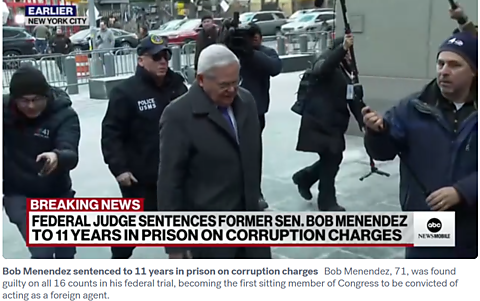We recently examined data on public corruption and noted that 80 to 90 percent of all corruption convictions result from federal prosecutions. The states appear to do little to prosecute corruption by their own state and local officials.
Why not?
It may be because of federal displacement or “crowding out.” When it comes to government spending, federal increases over the decades have crowded out state spending on infrastructure and other items. Similarly, it appears that the growth of federal corruption prosecutions since the 1970s has crowded out state prosecutions.
An article by James Madison University’s Robert Roberts discusses why the federal government was not much involved in state-local corruption prior to 1970 and why federal intervention has escalated since then.
In the late 19th and early 20th centuries, federal and state reforms—such as creating merit-based civil services—abated some of the rampant corruption of prior decades. In a 1903 address, President Theodore Roosevelt thundered that bribery “strikes at the foundation of all law” and “there can be no crime more serious.”
For a while, it appeared that government corruption was on the wane, and so there seemed to be no need for the Feds to intervene and police state-local abuses. US attorneys did not have clear jurisdiction to go after state-local corruption, and members of Congress did not want them investigating their home-state political allies. So, until the 1970s, there were relatively few federal prosecutions of state and local officials.
Then the situation changed, notes Roberts. The federal government passed a flood of new spending programs in the 1960s and 1970s that funneled billions of dollars through state and local governments, which created large opportunities for graft.
Around the same time, the Watergate scandal raised public awareness of unethical behavior in government. There was also growing media coverage of local corruption, such as the pervasive corruption uncovered in New York City’s police department.
Enterprising US attorneys began to broadly construe existing federal criminal statutes to go after state and local corruption, which they found to be a career-boosting strategy. Federal prosecutors targeted abuses using the Hobbs Anti-Racketeering Act and the honest services prong of the mail and wire fraud statutes.
In 1976, Congress created the Public Integrity Section (called “PIN”) in the Department of Justice (DOJ) to coordinate corruption investigations and prosecutions. In 1984, Congress enacted 18 U.S.C. § 666 to combat bribery and theft of federal monies by state and local officials and private organizations.
Today, the DOJ and the Federal Bureau of Investigation actively battle public corruption, which is a good thing. We can all applaud New Jersey Senator Bob “gold-bars-in-the-closet” Menendez getting slammed away for taking bribes to secure military aid to Egypt and other crimes.
However, with regard to state and local corruption, the states seem to have acquiesced to federal dominance. Consider these recent corruption cases, which are purely local in nature.
In Toledo, three city council members were convicted of taking bribes for votes on zoning changes and special use permits. The case was investigated by the FBI and prosecuted by the US Attorney for the Northern District of Ohio.
In Baltimore, a city employee took $250,000 in bribes for canceling or postponing resident payments for taxes, citations, and water bills. The case was investigated by the FBI and prosecuted by the US Attorney for Maryland.
Couldn’t the Toledo case have been handled by the Ohio Special Investigations Unit and Ohio state attorneys? And couldn’t the Baltimore case have been handled by the Maryland State Police and the Maryland Office of State Prosecutor?
It’s time for state governments to step up their policing of state and local corruption. Federal corruption prosecutions have fallen over the past decade, so there seems to be a void for state prosecutors to fill. Convictions may be down because underlying corruption is down, but I’m a little skeptical. The reduction could also stem from the Supreme Court narrowing the scope of laws that federal prosecutors may use to charge state and local officials.
There’s also an issue of resources. The number of staff in US Attorney’s offices has been roughly flat since 2000, even though the US population has grown by one-fifth. Also, President Trump is proposing to slash the DOJ’s PIN section staff by more than half, and a number of PIN attorneys have recently resigned.
All this creates an opportunity for the states to take more responsibility. Society pays a high price for public corruption, and thus it should be a high priority for law enforcement. Jason Kohn and Derrick Wang make the case for an increased state role in combating state and local corruption.
It makes sense for federal prosecutors to crack down on bribery and theft by federal employees and by state and local employees abusing federal monies. But the states should be cracking down on their own public officials breaking state laws to line their pockets.

